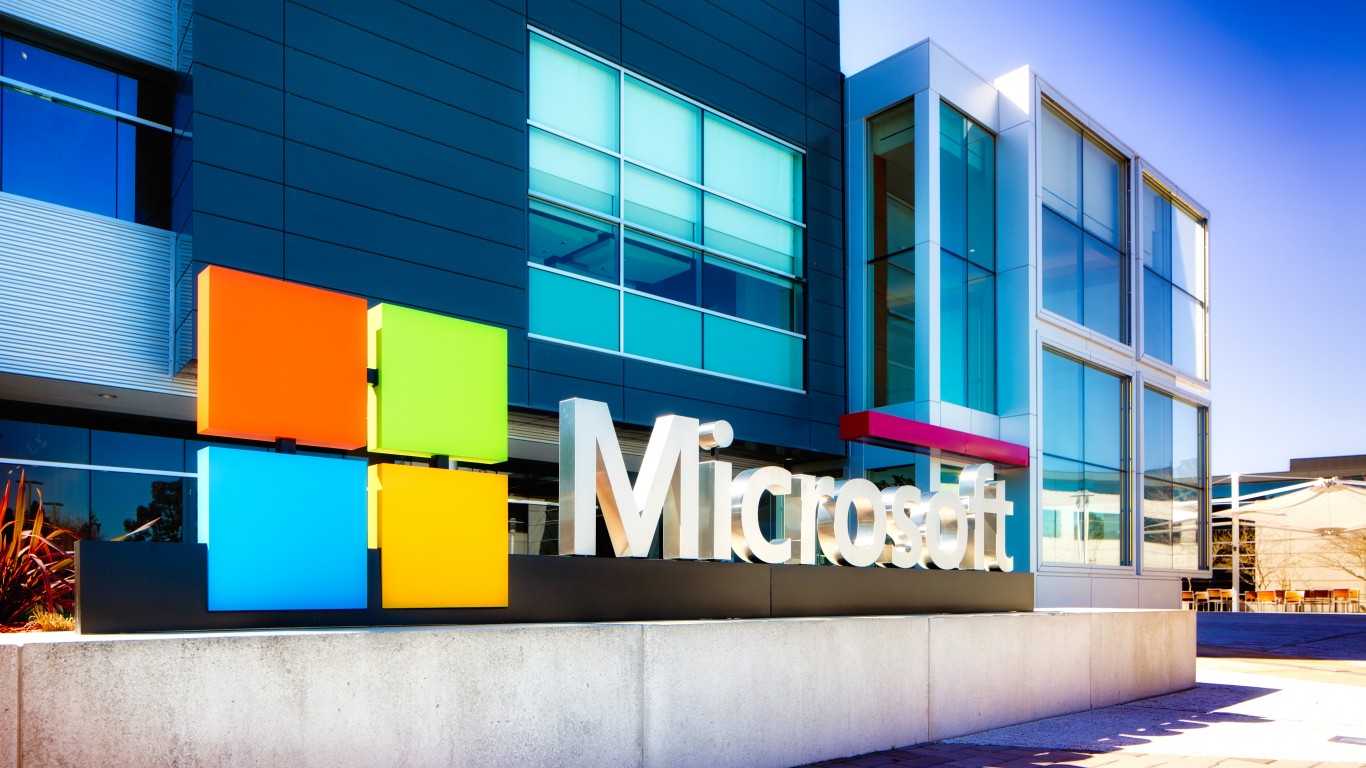
The buzz was there for years; artificial intelligence is the next big thing, but as usual, when it comes to technology innovation, the opening salvos from private equity and others took quite a while to catch up with reality. That all changed last year with the introduction of OpenAI’s Chat GPT, and then the company offered expanded access to OpenAI’s DALL-E 2 AI image and art generator.
The brave new world now has almost unlimited potential and possibilities for machine learning, intelligent applications and appliances, autonomous vehicles, and robotic applications. Numerous companies stand to benefit from the technological advances that AI will provide, and those who don’t use the technology in the coming years will surely regret it.
Big mega-cap technology companies are likely to benefit first as they have been embracing the onslaught of AI applications for years and have the deep pockets to get and make deals with the companies providing breakthrough technologies like OpenAi, C3.ai, and others.
Adobe
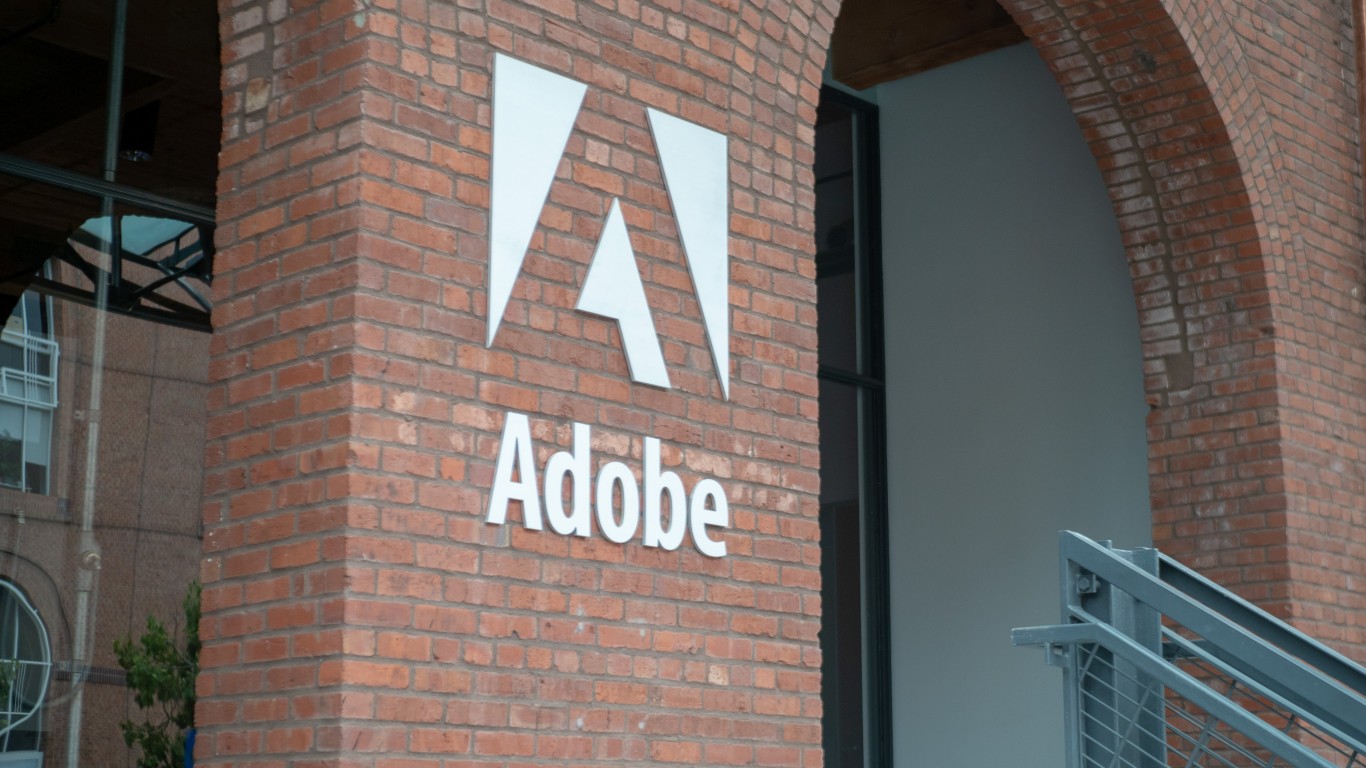
This large-cap legacy technology giant is a sleeper in the AI world and pays a 1.15% dividend. Adobe, Inc. (NASDAQ: ADBE) is a diversified software company worldwide.
It operates through three segments:
- Digital Media,
- Digital Experience
- Publishing and Advertising.
The Digital Media segment offers products, services, and solutions that enable individuals, teams, and enterprises to create, publish, and promote content, and Document Cloud, a unified cloud-based document services platform.
The Digital Experience segment provides an integrated platform and set of applications and services that enable brands and businesses to create, manage, execute, measure, monetize, and optimize customer experiences from analytics to commerce.
The Publishing and Advertising segment offers products and services like e-learning solutions, technical document publishing, web conferencing, document and forms platform, web application development, high-end printing, and Advertising Cloud offerings.
Earlier this year, Adobe revealed generative artificial intelligence services for creative professionals and marketers. The suite has Adobe Firefly, a new family of innovative generative AI models focused initially on image generation and text effects.
Advanced Micro Devices
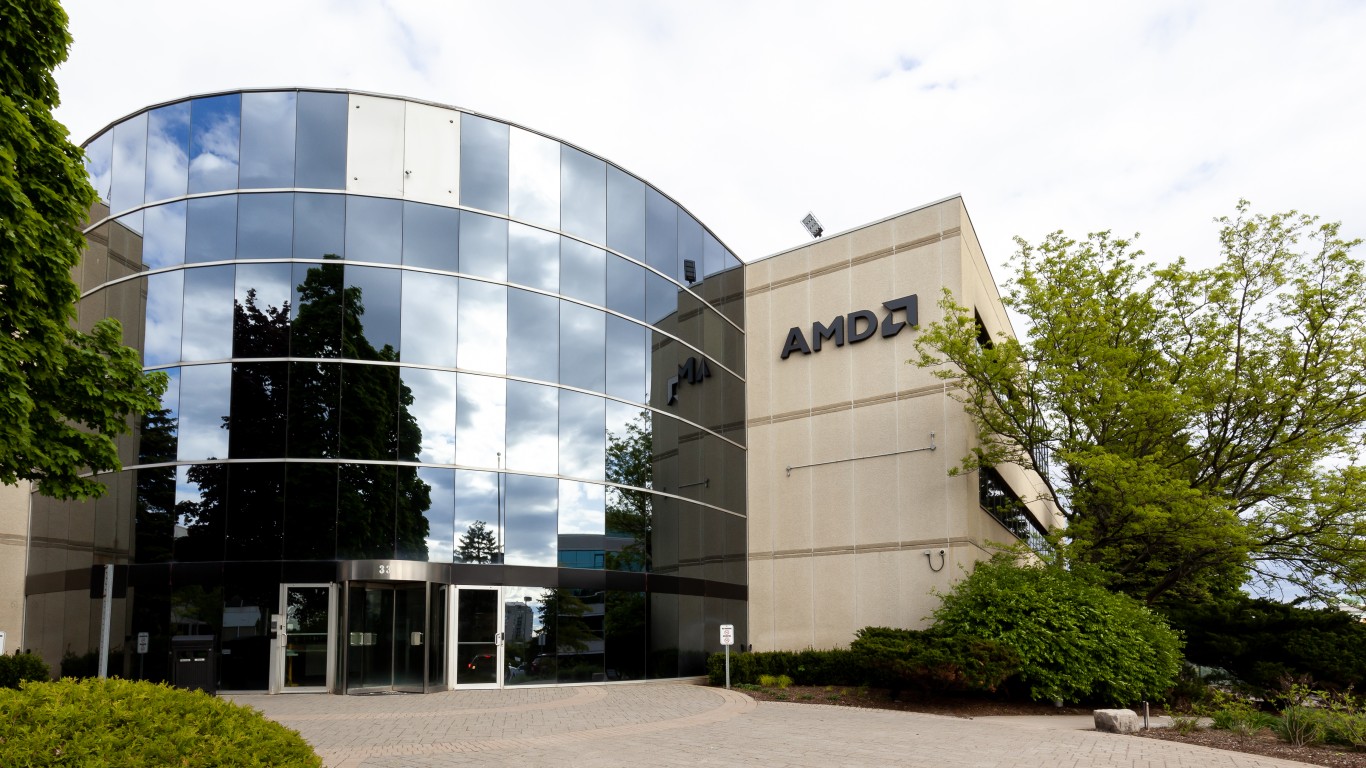
This top semiconductor company has returned from late October lows and pays a 1.16% dividend. Advanced Micro Devices, Inc. (NYSE: AMD) is a semiconductor company worldwide.
AMD operates in four segments:
- Data Center
- Client
- Gaming
- Embedded
The company offers x86 microprocessors and graphics processing units (GPUs) as accelerated processing units, chipsets, data centers, and professional GPUs; embedded processors and semi-custom system-on-chip (SoC) products; microprocessor and SoC development services and technology; data processing units, field programmable gate arrays (FPGA), and adaptive SoC products.
Earlier this year, the company unveiled its new Instinct MI300 chip series, which it claims is designed to speed up processing for generative AI, and that’s the technology used by ChatGPT and other chatbots.
Broadcom
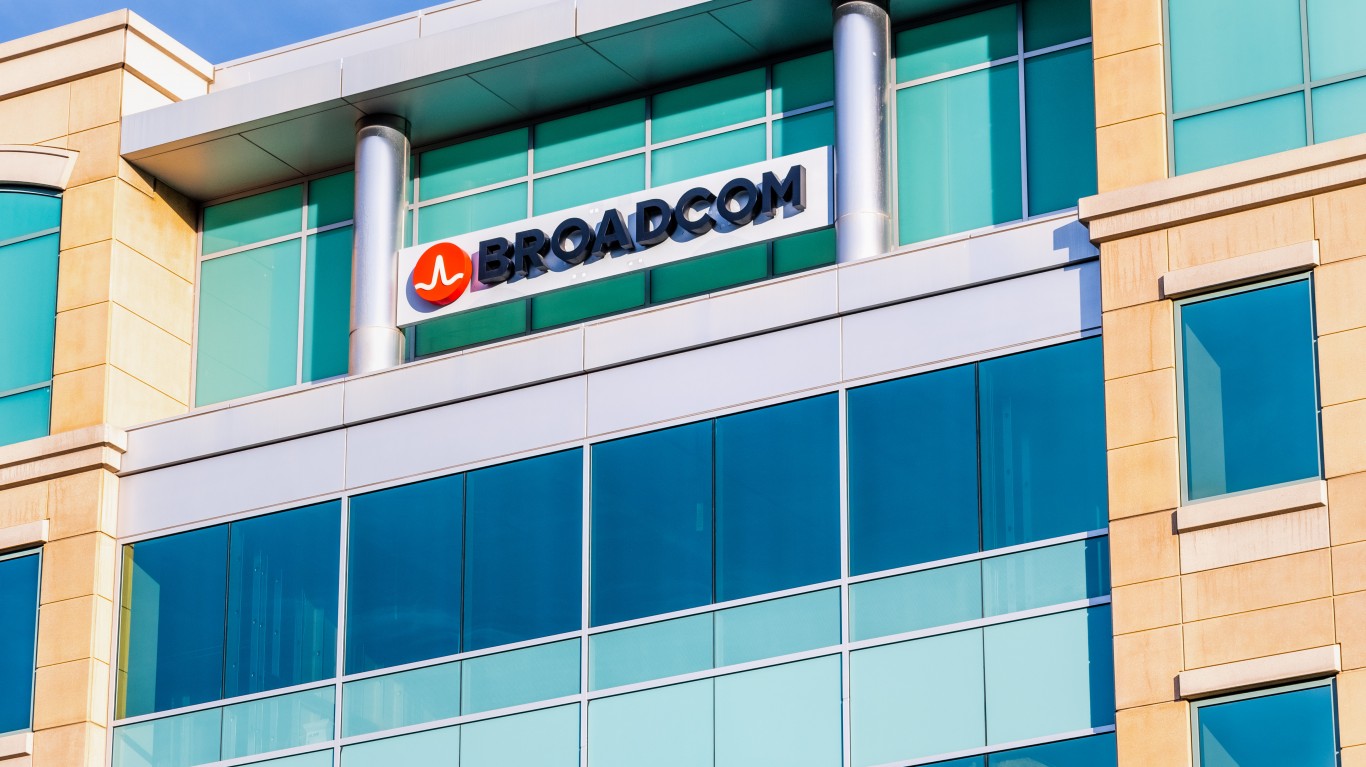
This stock has rallied back nicely, and Wall Street continues to like the company for dividend growth and the current 1.95% yield. Broadcom Limited (NASDAQ: AVGO) has an extensive semiconductor product portfolio that addresses applications within the wired infrastructure, wireless communications, enterprise storage, and industrial end markets.
Applications for Broadcom’s products in these end markets include
- Data center networking,
- Home connectivity,
- Broadband access,
- Telecommunications equipment,
- Smartphones,
- Base stations,
- Servers,
- Storage,
- Factory automation,
- Power generation,
- Alternative energy systems
- Displays.
Reports have indicated that Broadcom has developed some groundbreaking mechanisms to address the difficulty of building an Ethernet-based fabric that supports AI workloads. These mechanisms, which include a scheduling framework, cells, and credits, are intended to minimize congestion, latency, and dropped frames or packets in the fabric. Broadcom builds an Ethernet fabric optimized for AI using its Jericho3-AI and Ramon ASICs.
Intel
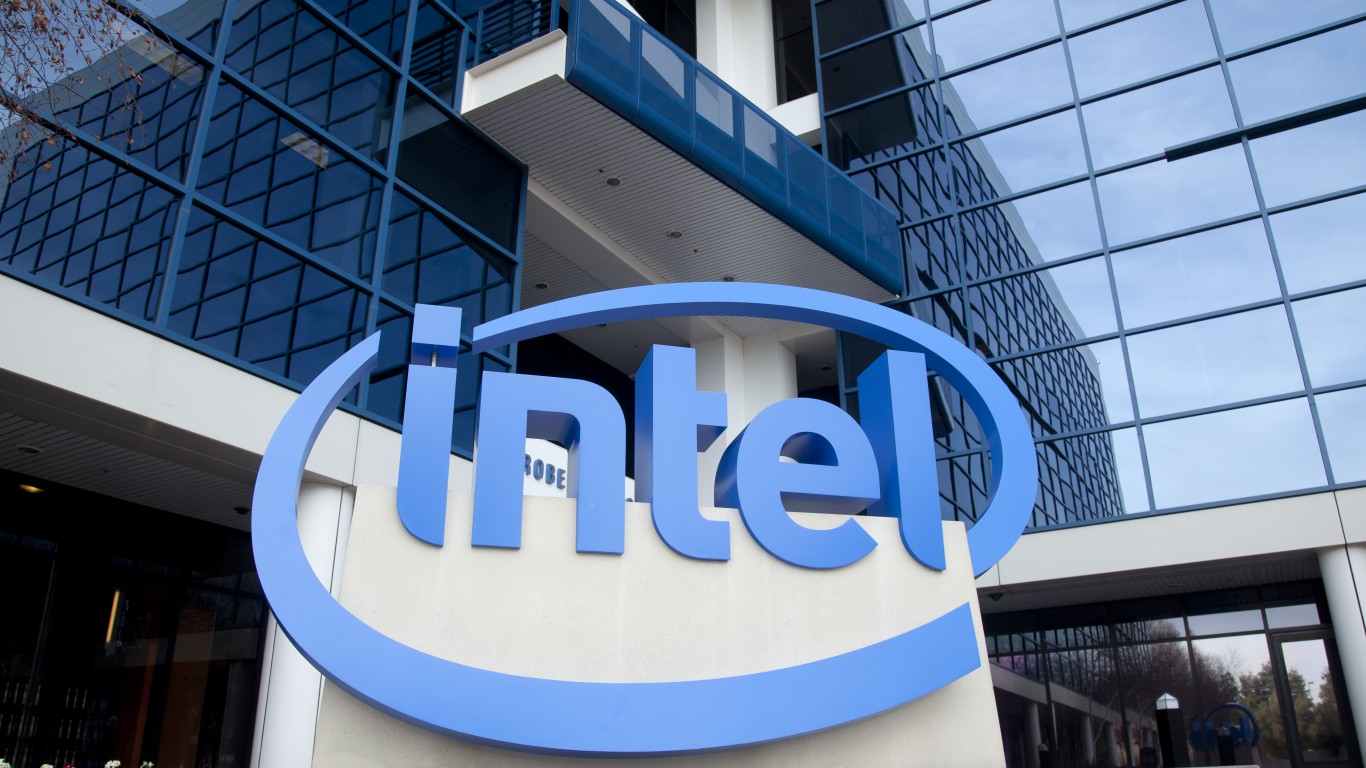
This semiconductor legacy leader has rallied back nicely, and the stock pays a 1.27% dividend. Intel Corp. (NASDAQ: INTC) designs, manufactures and sells integrated digital technology platforms worldwide.
Intel operates through
- Client Computing Group,
- Data Center Group
- Internet of Things Group
- Software and Services
- All Other segments.
The company’s platforms are used in various computing applications comprising notebooks, 2 1 systems, desktops, servers, tablets, smartphones, wireless and wired connectivity products, wearables, retail devices, and manufacturing devices, as well as for retail, transportation, industrial, buildings, home use, and other market segments.
The company announced over a year ago it would invest in a massive way to build potentially the world’s largest chip-making complex in Ohio, looking to boost capacity as a global shortage of semiconductors affects everything from smartphones to cars.
Intel’s portfolio of AI-enabling hardware and software – from CPUs, GPUs, and accelerators to the oneAPI programming model, OpenVINO developer toolkit, and libraries that empower the AI ecosystem – provides competitive, high-performance, open-standards solutions for customers to deploy AI at scale quickly.
International Business Machines

This blue chip legacy tech giant still offers investors a solid entry point and a 4.41% dividend. International Business Machines Corporation (NYSE: IBM) is a leading provider of enterprise solutions, offering a broad portfolio of IT hardware, business and IT services, and a full suite of software solutions. The company integrates its hardware products with its software and services offerings to provide high-value solutions.
IBM comprises five major segments: (1)
- Cognitive Solutions
- Global Business Services
- Technology Services & Cloud Platforms
- Systems
- Global Financing.
The company posted an excellent third quarter, as the cloud proved prominent in the earnings reports, as did Red Hat, the software giant the firm bought in 2019. Red Hat’s open hybrid cloud technologies are now paired with the unmatched scale and depth of IBM’s innovation, industry expertise, and sales leadership in more than 175 countries.
An AI and supercomputer pioneer with Watson, the company moved away from past projects in 2022 but has vowed to invest 20 billion over the next decade to develop and manufacture semiconductors, mainframe computers, and AI and quantum computing technology.
Marvell

This chip maker is probably well under the AI radar but possibly a big winner and pays a smaller 0.42% dividend. Marvell Technology, Inc. (NASDAQ: MRVL) and its subsidiaries provide data infrastructure semiconductor solutions, spanning the data center core to the network edge.
The company develops scales of complex System-on-a-Chip architectures, integrating analog, mixed-signal, and digital signal processing functionality. It offers Ethernet solutions, including controllers, network adapters, physical transceivers, and switches; single or multiple core processors; custom application-specific integrated circuits; and System-on-a-Chip solutions.
Marvell Technology also provides electro-optical products, including pulse amplitude modulations, coherent digital signal processors, laser drivers, trans-impedance amplifiers, silicon photonics, and data center interconnect solutions; fiber channel products comprising host bus adapters and controllers; single or multiple core processors; storage controllers for hard disk drives and solid-state-drives; and host system interfaces.
The company is modeling a stunning $400 million in AI sales this year and $800 million in 2024. Computing and AI applications have become Marvell’s cloud-optimized silicon platform’s most significant revenue drivers and opportunities.
Microsoft
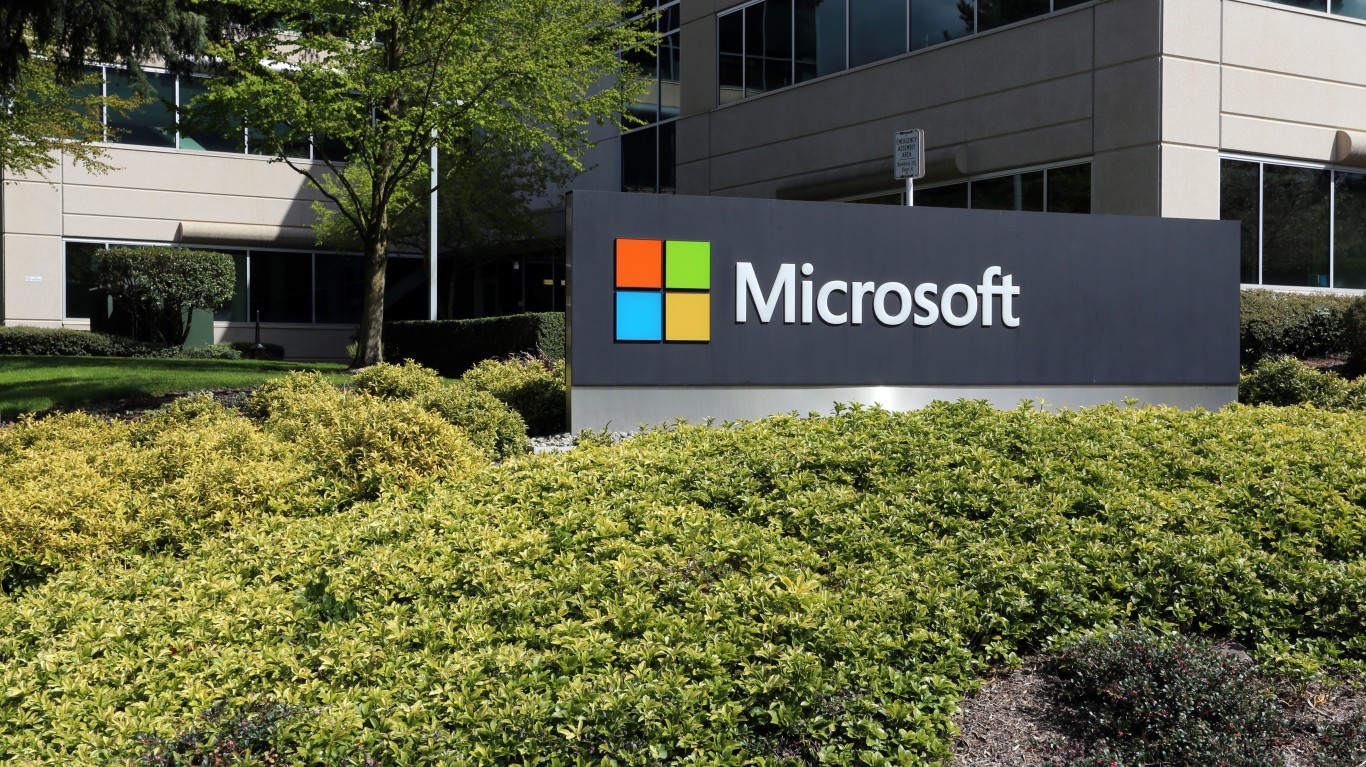
This is a more conservative way for investors to participate in the massive cloud and AI growth that pays a small 0.81% dividend. Microsoft Corporation (NASDAQ: MSFT) develops, licenses, and supports software, services, devices, and solutions worldwide.
The company operates in three segments:
- Productivity and Business Processes,
- Intelligent Cloud,
- More Personal Computing.
The Productivity and Business Processes segment offers:
- Office,
- Exchange,
- SharePoint,
- Microsoft Teams
- Office 365 Security and Compliance
- Microsoft Viva
- Skype for Business
- Outlook.com
- OneDrive
- Dynamics 365
The Intelligent Cloud segment licenses SQL, Windows Servers, Visual Studio, System Center, and related Client Access Licenses;
- GitHub provides a collaboration platform and code hosting service for developers;
- Nuance provides healthcare and enterprise AI solutions and
- Azure, a cloud platform.
- It also offers enterprise support, Microsoft consulting, and nuance professional services to assist customers in developing, deploying, and managing Microsoft server and desktop solutions and training and certification on Microsoft products.
The More Personal Computing segment provides
- Windows original equipment manufacturer (OEM) licensing and other non-volume licensing of the Windows operating system.
- Windows Commercial, such as volume licensing of the Windows operating system.
- Windows cloud services
- Windows commercial offerings; patent licensing
- Windows Internet of Things
The ChatGPT AI deal had been in the news in a big way after it was disclosed Microsoft had invested an additional $10 billion in the artificial intelligence module after starting with a $1 billion investment in 2019. Many feel that the venture into AI could be a huge tailwind for the company’s surging cloud business.
It’s been reported that Microsoft will receive 75% of OpenAI’s profits until it claws back its investments, after which it will have a 49% stake in the firm. Microsoft has also disclosed plans to launch an AI version of its Bing search engine powered by ChatGPT by the end of the month. It’s a good bet they will use AI in many of the company’s products and services.
Artificial Intelligence is here to stay, and there will continue to be heated discussion of the industry’s pros and cons and the multitude of applications and solutions that can and will be provided.
Elon Musk founded OpenAi in 2015, left the board in 2018, and has cut ties with the company. He has had harsh words from some of the “woke” issues arising from the technology and just released his own “anti-woke” AI chatbot, GROK, to rival the company. That proves that we are still in the formative years, and big money will be made in the future.
Are You Ahead, or Behind on Retirement? (sponsor)
If you’re one of the over 4 Million Americans set to retire this year, you may want to pay attention.
Finding a financial advisor who puts your interest first can be the difference between a rich retirement and barely getting by, and today it’s easier than ever. SmartAsset’s free tool matches you with up to three fiduciary financial advisors that serve your area in minutes. Each advisor has been carefully vetted, and must act in your best interests. Start your search now.
Don’t waste another minute; get started right here and help your retirement dreams become a retirement reality.
Thank you for reading! Have some feedback for us?
Contact the 24/7 Wall St. editorial team.





